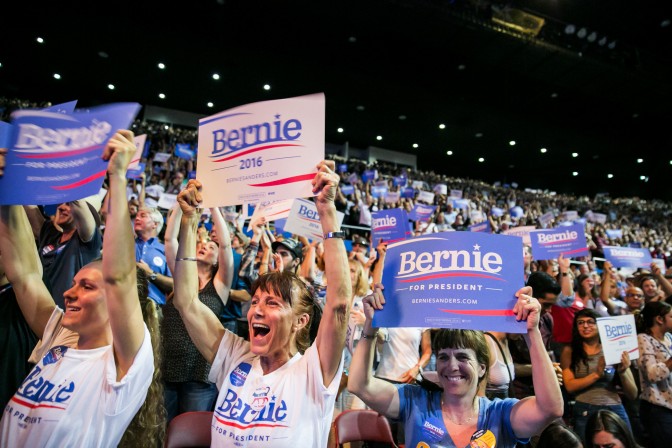With the constant increase in tuition prices, college students are already feeling the burn in their wallet. But students, including many at CSUN, are feeling a different type of burn: one caused by a self-described socialist named Bernie Sanders.
No one expected Sanders to capture this amount of attention, speaking to crowds that reach into the tens of thousands. Sanders has also captured the heart and mind of many college students. There is even a group of students on campus that tries to recruit volunteers on behalf of Sanders.
No other candidate has this much support on our campus. But this is not an endorsement of Sanders, but rather a libertarian dissent of him, of his policies and of his view of the future direction of the United States.
Much can be written on the flaws of Sanders’ policies, but I would like to focus on three: his views on the role of government, taxes and minority voters.
In many speeches, Sanders laments against a fundamentally corrupt government that only works for “a small and privileged few.” But instead of calling for a reduction in the size of government, he advocates increasing the size and scope of it.
Which leads me to ask an important question: if the government is really as corrupt as Mr. Sanders says it is, isn’t the only logical response to reduce the size of the government and not expand it? (If something is corrupt, one would want to shrink it, not increase it).
Increasing taxes is a central point to Sanders’ campaign, but rather than taxing people more, why not lower taxes? Yes, I said it, lower them. Taxes don’t just affect the rich; they disproportionately affect poor and middle-class individuals and families too. Taxes such as the federal, state, local income tax, sales tax (nine-percent in California), payroll tax, gasoline tax (39 cents for every gallon purchased), Social Security tax, Medicare tax, Medicaid tax, property tax, tobacco tax, alcohol tax and many, many more. Let us focus on a few specific ones.
The gasoline tax is a disaster for working families. It is obvious that poor and middle class families drive a lot. Families can spend upwards of one-thousand dollars (and possibly more) a year paying the gasoline tax. How much better financially would a family be if they didn’t have to pay for this tax?
Furthermore, Bernie Sanders called Social Security (which is funded by a tax that affects 95 percent of Americans), “the most successful government program in our nation’s history.” But like any socialist, he hilariously forgets to tell the American voters that Social Security will be bankrupt by 2037. Only in government can a bankrupt program be considered a success. If that is the case, then Donald Trump’s four bankruptcies are also successes too.
The argument about taxes comes down to one simple question: is the government more efficient at spending your money (through the taxes it collects from you) than you are? The answer is an obvious no. But just in case you think the government spends efficiently, look up a government funded campaign to get women to nag. Yes, the government spent two million of taxpayers’ dollars to get women to nag their partner into quitting smoking. You can’t make this up, folks.
Sanders has said that we need taxes to pay for the government services we receive. I disagree. Why not let the people keep their money, and let them spend it how they please?
Sanders has so far been unable to shore up support from minority voters.
Anna Mora, CSUN graduate student and Latino activist, says, “Latinos have not heard much about Bernie Sanders, who stands in favor of issues that very much pertain to the interest of Latinos, such as immigration reform, federal minimum wage, expanded social security, free healthcare, and [free] college tuition. He needs to do more outreaching to Latinos and their grassroots organizations in order to gain more popularity.”
As a Mexican-American, I respectfully disagree. Contrary to what Sanders and Mora say, more government intervention is not what is necessary to make minorities more successful. As a matter of fact, the government has trampled on the rights of minorities for decades, as seen through slavery, Jim Crow laws, and the prison industrial complex. Furthermore, minority voters do not want the handouts that Sanders is so quick to give out, but rather, they want jobs. For example, many immigrants leave the country of their origin, my parents included, not for more government or welfare, but to seek freedom and a chance at a better life.
The difference between Sanders and libertarians like myself is the question of who controls your life? Should the government control your healthcare, schooling, retirement savings, what you eat, what drugs you consume? Or should you, the individual, make the decisions?
I welcome the debate from the liberals and socialists in the Democratic Party. Sanders is a serious candidate and his policies and supporters must be grappled with seriously.
But what must be stated and restated is that more government intervention and control is not the answer to the United States’ problems: government is the problem.






